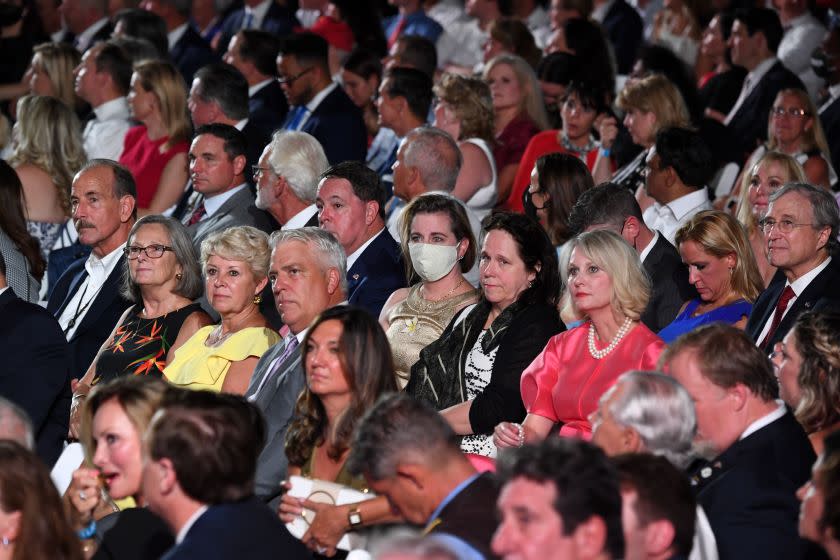Commentary: Trump closes RNC with a potential super-spreader event: Of COVID-19, racism and fear

The final night of the Republican National Convention featured President Trump delivering his lengthy acceptance speech for the party's nomination from the South Lawn of the White House, addressing an in-person audience of 1,500 largely maskless supporters, most of whom sat inches rather than feet apart and sweated profusely in the August heat as they clapped, whistled and chanted, “Four more years!”
The fervor was infectious at this potential super-spreader event, where supporters flouted CDC recommendations to hear Trump recite his dream list of successes, one of which was how wonderfully he’s combated the pandemic.
Opening the 2½-hour event was a video featuring a voiceover by actor Jon Voight, lambasting Democrats for "telling you what to wear” against images of Trump's Democratic opponent, former Vice President Joe Biden and his running mate, California Sen. Kamala Harris, wearing face masks.
Speaker after speaker warned about the terrible threat of a Biden presidency, the movement for Black lives, China, the violence of Democratic-run cities and the NBA, all while COVID-19 was given free rein.
Featured spokesman Rudy Giuliani sweated profusely in his folding chair while waiting for his turn on the communal mic. Cameras caught the former New York City mayor mopping his sweaty brow before leaning over to speak to a woman next to him, touching her arm with the mopping hand, as he leaned in closer.
It was notable that Senate Majority Leader Mitch McConnell taped his remarks hundreds of miles away in his home state of Kentucky, socially distanced in an open field. He lambasted the Democrats for telling Americans what to do, even when they can and can’t go to school. The Republicans “will continue to support American families as we defeat the coronavirus and return our economy to the envy of the world,” McConnell said, the surrounding tall grass as his witness.
The GOP’s election-focused narrative about the dangers of “radical Democrats,” and how wonderful things have been under Trump, was consistent in remarks from Sen. Tom Cotton (R-Ark.), House Minority Leader Kevin McCarthy (R-Calif.) and of course his own daughter, Ivanka Trump, who also serves as White House advisor.
The question was how, or if, the party would address this week’s police shooting of an unarmed Black man, the subsequent killing of two protesters against police brutality by a teenager deemed to be a white vigilante, or the ongoing unrest in Kenosha, Wis., and the rest of the country as the direct action begun in the aftermath of George Floyd's death this spring continues. Under Trump, the GOP has increasingly pandered to the radical Right, leveraging xenophobia and racism for votes and then failing to renounce the white supremacists they've invited into their ranks.
Midway through his speech Thursday, Trump did bring up Kenosha, but he did not mention Jacob Blake, who was shot seven times in the back by police. His comments were mostly in the service of warning Americans about the violence in the streets, and how he’d continue to keep them safe if reelected. Never mind that he also swore to protect all Americans, including those gunned down in recent days, when he took the oath of office.
The RNC has taken great pains throughout the week's telecast to highlight the president's Black supporters — he's preferred by 8% of Black registered voters versus Biden's 89%, according to Pew Research Center. But there was, curiously, no mention of the late Herman Cain, the former Republican presidential candidate and Black Votes for Trump surrogate who contracted COVID-19 after attending the president’s last mass gathering, in Tulsa, Okla., and died a month later.
During an earlier briefing Thursday dedicated to Hurricane Laura, Trump did answer at least one question about the nationwide protests for social justice. It had to do with the NBA strike action that began Wednesday.
“I know [the NBA’s] ratings are very bad because I think people are a little tired of the NBA, frankly,” said Trump. “I know their ratings have been very bad, and that’s unfortunate. They have become like a political organization. And that’s not a good thing. I don’t think that’s a good thing for sports or for the country.”
Since he was referring to TV ratings, a favorite subject of his and something few of us were paying attention to during the deluge of news this week, here’s a primer: ABC’s first NBA playoff game of this season fell 21% in viewership compared with last year.
Yet the NBA is still doing better than the RNC.
Wednesday’s convention averaged about 17.3 million viewers across six networks — ABC, NBC, CBS, CNN, Fox News and MSNBC. That’s a 31% drop from the same night at the RNC four years ago, when the same six outlets drew 24.4 million viewers. It's also lower last week's Democratic National Convention, which brought in 22.8 million viewers on its third night.
Trump’s also sagging in the national polls, where he’s trailing Biden by anywhere from 7 to 14 points. His mishandling of the pandemic is at the forefront, and it’s doubtful the RNC's grand finale did much to bolster confidence outside his base. As ever, with this questionable businessman-turned-reality-TV president, it's important to read the fine print: The message was "Vote for Trump and he'll keep you safe."*
*COVID-19 excluded.

